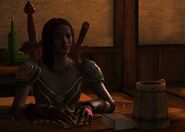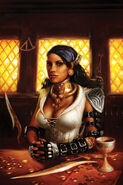"Proof and Nothing But the Proof, So Help Me Proof"
Sworn testimony is evidence given by a witness who has made a commitment to tell the truth. If the witness is later found to have lied whilst bound by the commitment, they can often be charged with the crime of perjury. The types of commitment can include oaths, affirmations and promises which are explained in more detail below. The exact wording of the commitments vary from country to country.
As almost the whole country was occupied by the Swedish or Russianarmies, the reason behind the vow was to incite the whole nation, including peasantry in the first place, to rise up against the invaders. Thus two main issues raised by the king in the vows were primarily - a necessity to protect the Catholic faith, seen as endangered by the Lutheran (and to some point Orthodox) aggressors, secondly - to manifest the will to improve the peasantry's condition.
On 1 April 1656, during a holy mass in Lwów's Cathedral, conducted by the papal legate Pietro Vidoni, John Casimir in a grandiose and elaborate ceremony entrusted the Commonwealth under the Blessed Virgin Mary's protection, whom he announced as The Queen of the Polish Crown and other of his countries. He also swore to protect the Kingdom's folk from any impositions and unjust bondage. Today, the Blessed Virgin Mary is known as the Queen of Poland. After the King, similar vow was taken by the Deputy Chancellor of the Crown and the bishop of Kraków Andrzej Trzebickiin the name of the szlachta noblemen of the Commonwealth.
The Commonwealth forces finally drove back the Swedes in 1657 and the Russians in 1661. After the war, promises made by John Casimir in Lwów, especially those considering peasants' lot, were not fulfilled, mostly because of Sejm's objection, which represented the szlachta nobility, not attracted to the idea of reducing serfdom, which would negatively affect their economical interests.
Perjury is the intentional act of swearing a false oath or of falsifying an affirmation to tell the truth, whether spoken or in writing, concerning matters material to an official proceeding. Contrary to popular misconception, no crime has occurred when a false statement is (intentionally or unintentionally) made while under oath or subject to penalty—instead, criminal culpability only attaches at the instant the declarant falsely asserts the truth of statements (made or to be made) which are material to the outcome of the proceeding. For example, it is not perjury to lie about one's age except where age is a fact material to influencing the legal result, such as eligibility for old age retirementbenefits or whether a person was of an age to have legal capacity.
Perjury is considered a serious offense as it can be used to usurp the power of the courts, resulting in miscarriages of justice. In the United States, for example, the general perjury statute under Federal law classifies perjury as a felony and provides for a prison sentence of up to five years. The California Penal Code allows for perjury to be a capital offense in cases causing wrongful execution. However, prosecutions for perjury are rare. In some countries such as France and Italy, suspects cannot be heard under oath or affirmation and thus cannot commit perjury, regardless of what they say during their trial.
The rules for perjury also apply when a person has made a statement under penalty of perjury, even if the person has not been sworn or affirmed as a witness before an appropriate official. An example of this is the United States' income tax return, which, by law, must be signed as true and correct under penalty of perjury (see 26 U.S.C. § 6065). Federal tax law provides criminal penalties of up to three years in prison for violation of the tax return perjury statute. See: 26 U.S.C. § 7206(1) Statements which entail an interpretation of fact are not perjury because people often draw inaccurate conclusions unwittingly, or make honest mistakes without the intent to deceive. Individuals may have honest but mistaken beliefs about certain facts, or their recollection may be inaccurate, or may have a different perception of what is the accurate way to state the truth. Like most other crimes in the common law system, to be convicted of perjury one must have had the intention (mens rea) to commit the act, and to have actually committed the act (actus reus). Further, statements that are factscannot be considered perjury, even if they might arguably constitute an omission, and it is not perjury to lie about matters immaterial to the legal proceeding. In the United States and Scotland subornation of perjury, attempting to induce another person to commit perjury, is itself a crime.
The rule of law is the legal principle that law should govern a nation, as opposed to being governed by arbitrary decisions of individual government officials. It primarily refers to the influence and authority of law within society, particularly as a constraint upon behaviour, including behaviour of government officials. The phrase can be traced back to 16th century Britain, and in the following century the Scottish theologian Samuel Rutherford used the phrase in his argument against the divine right of kings.[3] John Locke defined freedom under the rule of law as follows: “Freedom is constrained by laws in both the state of nature and political society. Freedom of nature is to be under no other restraint but the law of nature. Freedom of people under government is to be under no restraint apart from standing rules to live by that are common to everyone in the society and made by the lawmaking power established in it. Persons have a right or liberty to (1) follow their own will in all things that the law has not prohibited and (2) not be subject to the inconstant, uncertain, unknown, and arbitrary wills of others.”[4][3] The rule of law was further popularized in the 19th century by British jurist A. V. Dicey. The concept, if not the phrase, was familiar to ancient philosophers such as Aristotle, who wrote "Law should govern".
Rule of law implies that every citizen is subject to the law, including lawmakers themselves. In this sense, it stands in contrast to an autocracy, dictatorship, or oligarchy where the rulers are held above the law. Lack of the rule of law can be found in both democracies and dictatorships, for example because of neglect or ignorance of the law, and the rule of law is more apt to decay if a government has insufficient corrective mechanisms for restoring it. Government based upon the rule of law is called nomocracy.
The Aryan race was a racial groupingterm used in the period of the late 19th century to the mid-20th century to describe multiple peoples. It has been variously used to describe all Indo-Europeans in general (spanning from India to Europe), the original Aryan people specifically in Persia, and most controversially through Nazi misinterpretation, the Nordic or Germanic peoples. The term derives from the Aryan people, from Persia, who spoke a language similar to those that have been found in Europe.
While originally meant simply as a neutral ethno-linguistic classification, from the late 19th century onwards the term Aryan race has been used by people who promoted ideas about racial hierarchy, like the Nazis, who thought that the Germanic peoples were, in comparison to other peoples in the world, predominately descended from an ancient master race, whom they called "Aryan".
Aryanism developed as a racial ideology based on this idea.
The master race (German: die Herrenrasse,
das Herrenvolk ) was a pseudo-scientific concept in Nazi ideology in which the Nordic or Aryan races, which were thought to predominate among Germans and other northern European peoples, were deemed the highest in an assumed racial hierarchy.
The Nazi official Alfred Rosenberg believed that the Nordic race was descended from Proto-Aryans who he believed had prehistorically dwelt on the North German Plain and who had ultimately originated from the lost continent of Atlantis.
The Nazis declared that the Nordics (now referred to as the Germanic peoples), or Aryan as they sometimes called them, were superior to all other races. The Nazis believed they were entitled to expand territorially. This concept is known as Nordicism. The actual policy that was implemented by the Nazis resulted in the Aryan certificate, the one form of the official document that was required by the law for all citizens of the Reich was the "Lesser Aryan certificate" (Kleiner Ariernachweis) which could be obtained through an Ahnenpass which required the owner to trace his or her lineage through baptism, birth certificates or certified proof thereof that all grandparents were of "Aryan descent".
The Slavs (along with Gypsies and Jews) were defined as being racially inferior and non-Aryan Untermenschen, and were thus considered to be a danger to the "Aryan" or Germanic Übermenschen master race. According to the Nazi secret Hunger Plan and Generalplan Ost, the Slavic population was to be removed from Central Europe through expulsion, enslavement, starvation, and extermination, except for a small percentage who were deemed to be non-Slavic descendants of Germanic settlers, and thus suitable for Germanisation.
The Übermensch (German) (EnglishOverman or Superman) is a concept in the philosophy of German philosopherFriedrich Nietzsche—he posited the Übermensch as a goal for humanity to set for itself in his 1883 book Thus Spoke Zarathustra (German: Also Sprach Zarathustra). However, Nietzsche never developed the concept on racial grounds. Instead, the Übermensch "seems to be the ideal aim of spiritual development more than a biological goal."
Nazism distorted the real meaning behind the concept to fit its 'master race' view.
By the late 19th and early 20th centuries, it was posited that the Indo-Europeans (then generally also referred to as Aryans) made up the highest branch of humanity because their civilization was the most technologically advanced. This reasoning simultaneously intertwined with Nordicism which proclaimed the "Nordic race" as the "purest" form of said Aryan race. Today, this view is regarded as scientific racism because it contradicts racial equality by positing that one race is superior to all other races.
Scientific racism (sometimes race biology or racial biology or pseudoscientific racism) is the pseudoscientific study of techniques and hypotheses to support or justify belief in racism, racial inferiority, or racial superiority; alternatively, it is the practice of classifying individuals of different phenotypes or genotype into discrete races. Historically it received credence in the scientific community, but is no longer considered scientific.
Scientific racism employs anthropology(notably physical anthropology), anthropometry, craniometry, and other disciplines or pseudo-disciplines, in proposing anthropological typologiessupporting the classification of human populations into physically discrete human races, that might be asserted to be superior or inferior. Scientific racism was common during the period from 1600s to the end of World War I. Since the second half of 20th century, scientific racism has been criticized as obsolete and discredited and has historically been used to support or validate racist world-views, based upon belief in the existence and significance of racial categories and a hierarchy of superior and inferior races.
After the end of World War II, scientific racism in theory and action was formally denounced, especially in UNESCO's early antiracist statement "The Race Question" (1950): "The biological fact of race and the myth of 'race' should be distinguished. For all practical social purposes 'race' is not so much a biological phenomenon as a social myth. The myth of 'race' has created an enormous amount of human and social damage. In recent years, it has taken a heavy toll in human lives, and caused untold suffering".
Such "biological fact" is no longer considered to exist as developments in human evolutionary genetics showed that human genetic differences are nearly totally gradual. The term "scientific racism" is generally used pejoratively as applied to more modern theories, as in The Bell Curve(1994). Critics argue that such works postulate racist conclusions unsupported by available evidence. Publications such as the Mankind Quarterly, founded as an explicitly race-conscious journal, are generally regarded as platforms of scientific racism for publishing articles on fringe interpretations of human evolution, intelligence, ethnography, language, mythology, archaeology, and race subjects. The label "scientific racism" is used to criticize studies claiming to establish a connection between, for example, race and intelligence, and is used to argue that this promotes the idea of "superior" and "inferior" human races.
Voluntarism is "any metaphysical or psychological system that assigns to the will (Latin: voluntas) a more predominant role than that attributed to the intellect", or, equivalently, "the doctrine that will is the basic factor, both in the universe and in human conduct."
This description has been applied to various points of view, from different cultural eras, in the areas of metaphysics, psychology, political philosophy, and theology. The term "voluntarism" was introduced by Ferdinand Tönnies into the philosophical literature and particularly used by Wilhelm Wundt and Friedrich Paulsen.
The Will, generally, is that faculty of the mind which selects, at the moment of decision, the strongest desire from among the various desires present. Will does not refer to any particular desire, but rather to the capacity to act decisively on one's desires. Within philosophy the will is important as one of the distinct parts of the mind, along with reason and understanding. It is considered important in ethics because of its central role in enabling a person to act deliberately.
One of the recurring questions discussed in the Western philosophical tradition is that of free will - and the related but more general notion of fate - which asks how the will can be truly free if a person's actions have natural or divine causes which determine them. This in turn, is directly connected to discussions on the nature of freedom itself and also the problem of evil.
The problem of evil refers to the question of how to reconcile the existence of evil with an omnibenevolent, omniscient, and omnipotent God (see theism). An argument from evil attempts to show that the co-existence of evil and such a God is unlikely or impossible. Attempts to show the contrary have traditionally been discussed under the heading of theodicy. Besides philosophy of religion, the problem of evil is also important to the field of theology and ethics.
The problem of evil is often formulated in two forms: the logical problem of evil and the evidential problem of evil. The logical form of the argument tries to show a logical impossibility in the coexistence of God and evil, while the evidential form tries to show that given the evil in the world, it is improbable that there is an omnipotent, omniscient, and wholly good God. The problem of evil has been extended to non-human life forms, to include animal suffering from natural evils and human cruelty against them.
Responses to various versions of the problem of evil, meanwhile, come in three forms: refutations, defenses, and theodicies. A wide range of responses have been made against these arguments. There are also many discussions of evil and associated problems in other philosophical fields, such as secular ethics, and evolutionary ethics. But as usually understood, the "problem of evil" is posed in a theological context.
The problem of evil acutely applies to monotheistic religions such as Christianity, Islam and Judaism that believe in a monotheistic God who is omnipotent, omniscient and omnibenevolent; but it has also been studied in religions that are non-theistic or polytheistic, such as Buddhism, Hinduism and Jainism.
Original sin, also called ancestral sin,[1]is the Christian doctrine of humanity's state of sin resulting from the fall of man, stemming from Adam and Eve's rebellion in Eden, namely the sin of disobedience in consuming from the tree of knowledge of good and evil.[2]This condition has been characterized in many ways, ranging from something as insignificant as a slight deficiency, or a tendency toward sin yet without collective guilt, referred to as a "sin nature", to something as drastic as total depravity or automatic guilt of all humans through collective guilt.[3] The concept of original sin was first alluded to in the 2nd century by Irenaeus, Bishop of Lyon in his controversy with certain dualistGnostics. Other church fathers such as Augustine also developed the doctrine,[2] seeing it as based on the New Testament teaching of Paul the Apostle (Romans 5:12–21 and 1 Corinthians 15:22) and the Old Testament verse of Psalms51:5. Tertullian, Cyprian, Ambrose and Ambrosiaster considered that humanity shares in Adam's sin, transmitted by human generation. Augustine's formulation of original sin was popular among Protestant reformers, such as Martin Luther and John Calvin, who equated original sin with concupiscence, affirming that it persisted even after baptism and completely destroyed freedom. The Jansenist movement, which the Catholic Church declared to be heretical, also maintained that original sin destroyed freedom of will.
Namaste,
- Meta
Background
Isabela's birth name is Naishe. She was born in Rivain to Madam Hari, a notorious thief and charlatan, and an unknown father who was described as "large, hairy, and good with his hands"[1] by her mother. When she became a pirate, the first ship's captain she served under began to call her "Isabela," his "little beauty," as a joke and she eventually adopted the name as her pseudonym.
Madam Hari was a thief and charlatan who had infamously posed as a Rivaini seer to help a village in the Rivaini interior in exchange for coin. When she got bored, she would leave the village to steal from other people or con them into buying mystical charms like the Rivaini Fertility Talisman. These trips could last weeks, and Hari would often take her daughter with her to help. The young Isabela took to dishonesty quickly. But Madam Hari grew disillusioned with the life of a fraud and eventually she converted to the Qun to give meaning to her life. She sold Isabela into marriage with a business associate of the Antivan Crows, Luis, when she refused to convert. While Isabela offers numerous interpretations of the bargain her mother struck when she was given away, she is noted as having told Varric Tethras once that her mother gave her away in exchange for nothing more than the promise that she would be looked after. Luis took her to Antiva City and they were married three weeks later, just shy of Isabela's nineteenth birthday.[1]
As a result, Isabela has a poor opinion of her mother. When romanced, she will say to Hawke, "At least your mother loved you. Not everyone can say that."[2] Similarly, if she is present while speaking to Arianni when beginning Wayward Son, she will comment that Feynriel is lucky to have a caring mother.
Luis was a rich man, buying Isabela many fine things, hiring a tutor to teach her to read and write, but the marriage was loveless and she was treated as his "plaything." Though Isabela enjoyed the first few months of her life with Luis, she quickly became bored, and then angry when it became clear she was expected to act as "befitted the lady of the house". After a year, Isabela began to deliberately antagonize him, thinking he'd let her go. Around this time, she met Zevran Arainai in Antiva City, and promptly started an affair, based mostly on physical attraction and a desire to test her boundaries with Luis. Zevran also taught her the basics of knife combat.
Realizing that his young wife was out of control, Luis resolved to get rid of her. According to his journal, he planned to "lend" her to certain business acquaintances who had expressed an interest. He was assassinated in his bed a week later by Zevran. Isabela provides differing accounts of the exact circumstances of his assassination to different parties. If Isabela is romanced by Hawke she claims that she did not have Luis killed, although she was grateful for his death regardless, however she later claims to Varric that she directly ordered his assassination. The Antivan Crows keep their records secret, and so the identity of the person who wished Luis dead has never been revealed. Though it is unclear whether Isabela contracted the assassination, she helped Zevran accomplish his task by giving him the location of the key to Luis' room.
On the same night, she left the house with nothing but two daggers (given by Zevran, who carried seven on his person) and a sack full of jewelry she used to bribe sailors into helping her commandeer the Siren's Call, her husband's ship. They sailed to Llomerryn, where the sailors abandoned her. A day later, Isabela used her untested knife skills to duel a man she has only referred to as the Jackdaw, betting that if she could best him in single combat, he would have to help her hire a crew and find a job. Isabela won the duel, though she's unsure whether the Jackdaw let her win out of pity. She found herself a new crew and a new captain (as she knew she would be unable to captain her own ship and wanted to learn under someone who could). She later killed the captain over an insult and took back control of the Siren's Call. There are rumors that she and the Jackdaw started a passionate love affair, though he disappeared never to be seen again a year after they met.[1]
After she became a pirate, Isabela became extremely promiscuous, and soon became a raider—the self-proclaimed "Queen of the Eastern Seas."[3] By the time she landed in Kirkwall, she had been a captain for approximately 10 years.[4]
- See also: Isabela (short story) Note: This story takes place after the events of Dragon Age: Origins and just before Dragon Age II.
Involvement
Dragon Age: Origins

Isabela's appearance in Dragon Age: Origins
Isabela can be found at The Pearl along with her first mate Casavir. She is arguing with three other men. Soon afterwards a fight breaks out however she manages to defeat the group of men due to her superior dueling skills. Her ship is staying in Denerim to let her men fill up on supplies and other "pleasures". Zevran knows her from before and, if brought along, will introduce her as the "Queen of the Eastern Seas and the sharpest blade in Llomerryn."
In order to convince Isabela to teach the Duelist specialization, there are two options: Beat her in a game of cards named Wicked Grace, or "get to know each other better" by following her to bed.
To beat Isabela in the card game, the Warden will have to be dexterous enough to catch her cheating or subtle enough to cheat. If Zevran or Leliana are in the party, they can also help the Warden to win, but will only offer assistance if their approval is high enough.
For Isabela to take the Warden up on his/her offer to get to know her better, the Warden will have to be persuasive (Coercion * 25 + Cunning bonus must be at least 75, so three points in coercion by itself will do the trick regardless of cunning). If the Warden is in a romance (love) with Morrigan, an unhardened Leliana or an unhardened Alistair, then the Warden's romance partner will publicly disapprove and Isabela will not go to bed with the Warden. However, if either Leliana or Alistair is not only in a love-relationship with the Warden but has also been "hardened" following their personal quests, then they will actually join in the fun for a threesome (or possibly a foursome) and their approval will increase. If Zevran is in the party, Isabela will invite him as well (regardless of his relationship status with the Warden). If the Warden accepts, Zevran's approval will increase. Nevertheless, Zevran will decline the offer if Alistair is included. The following combinations are thus possible:
- Isabela-Warden
- Isabela-Warden-Leliana
- Isabela-Warden-Zevran
- Isabela-Warden-Alistair (female Warden only)
- Isabela-Warden-Leliana-Zevran
Once the Duelist specialization has been learned from her, Isabela will have no further dialogue or interactions.
Reactions and approval
- If Leliana has been flirted with but her personality has not been hardened by the time Isabela is spoken to, she will get jealous and ask, "What about us?", which will cause Isabela to take back her offer to sleep with the Warden.
- If the Warden is female but not in a relationship with Alistair, he will wonder if he's dreaming, and then say that he's going to jump in the ocean. This doesn't occur if Leliana or Zevran joins in.
- Morrigan is not nearly as open-minded about Isabela as the other romanceable companions. She will strongly disapprove if Isabela is bedded and tell the Warden to rinse off the stench after they are done "rolling around in the gutter". If the Warden is romantically involved with Morrigan a different dialogue occurs. Morrigan gets furious and states that she will not touch the Warden again if he goes through with it. The Warden will not be allowed to bed Isabela in this case. (The only way then is to make sure she is not in the party.)
- (If the Warden is female and Oghren is in the party, he will faint if the Warden and Leliana go to bed with Isabela.)
Inviting a companion to bed with Isabela nets the following approval changes:
 Alistair approves (+2)if he joins.
Alistair approves (+2)if he joins. Leliana approves (+4)if she joins and the Warden is female.
Leliana approves (+4)if she joins and the Warden is female. Zevran approves (+7)if Isabela's invitation for him to join is accepted.
Zevran approves (+7)if Isabela's invitation for him to join is accepted. Zevran disapproves (-3)if Isabela's invitation for him to join is denied
Zevran disapproves (-3)if Isabela's invitation for him to join is denied
Dragon Age II
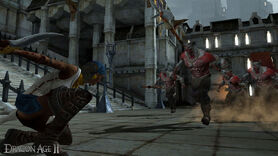
Isabela fighting against Qunari
Isabela plays a major role in Dragon Age II as a companion and possible love interest.
"Isabela is the pirate scourge of two coastlines, four nations, and countless tavern floors. She's equally skilled with dagger and insult, and it's hard to know which cuts deeper. It's rare to see her in one place for long, but with her ship reduced to timbers, Isabela's had to content herself with whatever bounty Kirkwall has to offer. And that means no end of headaches for the rich and foolish, and no end of amusement for her. She's as desired as she is feared, which is to say, a lot and often. Fall on her blade, or at her feet—a win is a win, in her book. Shipwrecked, hounded, Isabela hasn't decided if she's cornered yet. She's having too much fun."[5]
In Dragon Age II Isabela is first encountered at a tavern in Lowtown named the Hanged Man where she engages in a brawl with Lucky and his cohorts. She will only appear after recruiting Anders. It is also possible to never recruit or even meet her as she does not directly impact the outcome of the game. However she is involved in the Arishok battle and consequently affects Act II heavily. Varric will mention her during party chatter even if Hawke has not met her.
Isabela is no longer a captain, as her ship, along with its crew, were lost at the reefs near Kirkwall during a heavy storm. She worked as a smuggler, transporting lyrium, jewels and criminals, but had fallen out of favor with Castillon, a crime lord tied to the Felicisima Armada. Castillon hired Isabela to supervise a shipment, but she eventually discovered the "cargo" was in fact nearly 200 Blight refugees--humans and elves, including children--that Castillon had taken as slaves.[6] It is never revealed where she was intended to deliver these slaves, only that Kirkwall was not her destination. She freed the slaves and, as renumeration, Castillon ordered her to retrieve a valuable relic in order to pay off her debts. It is never revealed to where she released the slaves, though her old contact Hayder mentions that she let the slaves "scurry off into the wilds."[7]
Once she had the relic her ship was wrecked in a storm. She lost her ship, crew, and the relic. When Isabela is first encountered, she will reveal she has so far been unsuccessful in finding the relic again and one of Castillon's men is hounding her for it. Hawke and company can agree to help Isabela in her quest by escorting her to meet Hayder, an enforcer of Castillon whom she worked with in Antiva. After a failed ambush attempt by Hayder's men, the group tracks Hayder to the Chantry and kills him. Isabela concludes that as long as she provides Castillon with the relic before he finds her, he will be satisfied.
It's possible that Isabela will permanently leave the party at the end of the quest To Catch a Thief, during which she enlists Hawke's help in retrieving the Qunari relic called the Tome of Koslun from another thief called Wall-Eyed Sam. During the quest, it is revealed that Isabela stole the Tome from the Orlesians, who were attempting to return it to the Qunari. While fleeing a pursuing Qunari dreadnought, both the dreadnought and Isabela's ship were caught in a storm and shipwrecked; thus explaining the Qunari's and Isabela's current predicament. Hawke's party will fight with Tevinter mages and some Qunari led by a Sten in the Dark Foundry. Isabela runs away at the start of the battle to chase Wall-Eyed Sam, leaving Hawke and two other party members to plow through the remaining enemies. After leaving the building, Hawke will find Isabela's Letter on Wall-Eyed Sam's body which reveals that she made off with the Tome of Koslun and is planning to leave Kirkwall. If romanced, or having a high enough friendship or rivalry, she will return at the end of the same Act to deliver the relic to the Qunari, saying that Hawke's influence was what made her come back. It is at this point that the opportunity presents itself to either deliver her to the Qunari for them to exact punishment for her theft, and to forestall further assault on the city, or to duel the Arishok for her life. Defeating the Arishok will cause Isabela to rejoin the party with the option of continuing her romance. If given to the Qunari she will never return in-game, though Varric hints at the start of Act III that she may have eluded the Qunari and escaped.
If Isabela returns in Act 3, her last companion quest No Rest for the Wicked involves her plot to lure Castillon into a trap and blackmail him to stop hunting her and give her his ship. Hawke can allow Isabela to proceed with the deal or force Isabela's hand by attacking Castillon, thus killing the slaver.
If asked for her opinion of Anders' actions in The Last Straw, Isabela will state that she thinks it was a "bold plan". Isabela will side with Hawke regardless if they side with the templars or the mages but will sarcastically mock the righteousness of their actions if Hawke chooses to side with the templars. When the party members say their last words to Hawke before the final battle, Isabela reaffirms her loyalty to Hawke.
Friendship and rivalry
- See the approval page for more information.
Isabela values fun, freedom and getting ahead; she responds well to sarcasm. Jokes, flirting and a Hawke who solves problems in particularly clever and devious ways will delight her. She also approves if Hawke is slightly selfish in dealing with other people, trying to squeeze a little extra money out of them.
Getting involved in other people's business tends to annoy Isabela, so helping a character just for the sake of helping and not asking for a reward will often earn her ire. She also generally disapproves of rules and authority and attempts by Hawke to enforce rules on other people (especially her).
Another thing to note is that in some cases, Isabela will also respond well to Hawke's decision to not get involved at all in matters of no immediate concern to Hawke or their companions. Butting in to personal discussions, disagreements, and the like will sometimes irk Isabela. This is especially true with people Hawke has never met before.
Romance
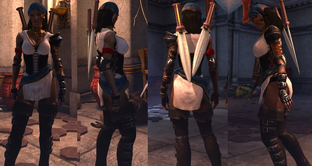
Alterations to Isabela's armor after romance.
Isabela was the first romance option announced for both male and female Hawke.
It is possible to pursue a romance through proper dialogue in Act 2 and eventually solidify it in the final moments of Act 3. However, like Fenris, Isabela will not move into the Hawke Estate.
Keeping the Isabela Romance: Isabela is usually the first romance to become available, thus, if a player wishes to keep her as the primary love interest, they may encounter certain challenges. Generally speaking, if another companion is romanced and moves in with Hawke, the move automatically breaks off all other romances, including Isabela (who will never move in). However, that does NOT mean it is safe to romance other characters as long as they don't move in. It is confirmed (1.04) that simply sleeping with Merrill can (and likely will) break off the romance with Isabela. In other words, even if you sleep with Merrill and immediately break it off at the first possible opportunity (right after the sex), you will most likely have terminated the Isabela romance regardless. In such a case, you can and likely will end up without either romance. But if you want to sleep with Merrill and afterwards romance Isabela, the solution is to simply not speak to Isabela in Act 2 until you had sex with Merrill and broke the romance afterwards.

Isabela during her bedroom scene in Act 2
In Act 2, talk to her in the Hanged Man and choose all the possible flirt options for both quests. The quests will be available from the start of the Act, and afterwards she will approach Hawke in their estate. If Hawke chooses to engage in the romance scene, she will be reluctant to bring love into their relationship. Isabela will state that they were merely "rutting" and that her "curiosity is sated" and will ask if Hawke intended something more. Hawke then has two dialogue options: "Why not?" and "Of course not." The first opens up an option to continue the romance, and Isabela will then reveal the circumstances of her past: her mother sold her into marriage to her husband for a goat and some coins against her will. She was forced to remain with him until Zevran assassinated him, allowing her to take over the ship and become captain herself. Isabela will also reveal that she has only truly loved someone once, a man of unknown name, but she fled after he asked for her hand and broke his heart in the end. Though she will seem annoyed at Hawke for questioning her, she will walk away with +10 friendship if she is asked (or +10 rivalry, if the romance is based on rivalry).
If Isabela is romancing Hawke she will return at the end of Act 2 with the Tome of Koslun. If Hawke kills the Arishok rather than let him take her, she will argue with Hawke and leave Kirkwall, telling the Champion "I didn't do it for them. I did it for you. It was always about you." [8] Isabela spends some time away from Kirkwall, returning just before the start of Act 3. She feels that returning the relic to the Qunari was a foolish decision and partially blames Hawke for getting her in more trouble with Castillon. After her quest No Rest for the Wicked is finished, she offers Hawke a position on her new ship, admitted if someone like Hawke was on board her old one, she would likely never have crashed. She then admits nervously she thinks she is falling for Hawke and asks if Hawke feels the same way, which the Champion can accept or deny.
If Hawke has engaged in a rivalry romance and told her to keep the ship, she will admit regretting to do so. If she was not allowed to have it, she'll say that she is happy that Castillon is gone, and that she feels good about avenging the people he wronged. She then will say she is willing to change "for you", if she is given some time. The rest of the dialogue is the same as the friendship romance.
At the end of the game, Varric says all the companions separated from Hawke, "except Isabela of course."
Sometimes a bug occurs which causes Varric to state in the epilogue that Isabela remained with Hawke, even if another companion was romanced at the game's end.[9]
If neither Isabela nor Fenris are romanced, they will take up an off-screen physical relationship in Act 3, though there appear to be no emotions involved.
Fate
Like most of Hawke's companions, Isabela may either remain with Hawke for the whole game, or leave the party at an approval-related crisis point - though in Isabela's case, the question is not whether she will leave the party, as she always does, but rather whether she will return to it, and whether Hawke will take her back once she does. In order for her to return to the party at the climax of Act 2, she must have a Friendship or Rivalry score of fifty or greater, and her final Act 2 companion quest. If romanced, she will return even if Questioning Beliefs was not completed. On this path, Isabela will either stay permanently at (a successfully romanced) Hawke's side, or disperse to an unknown fate after the epilogue like Hawke's other companions.
If Isabela leaves with the Tome, she makes it to Ostwick, and then continues her old life of piracy. If she is given to the Qunari, Varric will say that he heard she escaped the Qunari two days later with the book by jumping into the ocean, but he says he does not know if this is true or not.
Dragon Age: The Silent Grove
Isabela accompanies Varric and King Alistair to Antiva City, where they infiltrate the headquarters of the Antivan Crows. After meeting Prince Claudio Valisti - a former "business partner" of Isabela's late husband - Isabela warns Alistair to not trust a word Claudio says.
Isabela assists in infiltrating Velabanchel, and - along with Varric - holds off the Antivan Crows while Alistair goes after his target.
Isabela captains the ship she and her companions use to escape Velabanchel, later navigating through the Tellari swamps. She is the first to attempt to defend Alistair from an attack from Yavana's high dragon.
While leaving the swamps following their meeting with Yavana in the Silent Grove, Isabela is pierced by an arrow. Claudio Valisti turns out to be the culprit, and kidnaps Alistair in exchange for Isabela and Varric's lives. Isabela swears to hunt Claudio down and kill him.
After retreating to the Silent Grove, Isabela demands that Yavana save Alistair. The witch replies that it is not her concern, but Varric bargains with her. Yavana places a mysterious enchantment on the pair, healing Isabela's wound. The two then storm Claudio's camp. Isabela engages Claudio in a duel. Claudio insists that Isabela was not good enough for her late husband - Luis - and that she is trying to seduce Alistair to become queen of Ferelden. He also says that she was dragged out of the gutter because of her marriage, and that Luis lavished her with wine and silks, and after bedding him and whispering kind words in his ear for many nights she had him assassinated. Claudio bests Isabela, and is about to deliver the killing blow when she cuts off his hand, slits his throat and stabs him through the heart.
Dragon Age: Those Who Speak
While in Dragon Age: The Silent Grove all events were described by Alistair, in this comic series Isabela is the one who tells the story. She accompanies Alistair in his pursuit for Aurelian Titus as a hired hand and a confidante.
They travel to Qarinus and attend a ball, where she meets a person she appears to be familiar with - Lord Devon. Isabela seems to have a long-lasting hatred for him. Devon in turn is surprised that she is still alive. In a conversation "eye-to-eye" he mentions that Isabela owes him and threatens to reveal to Alistair what happened at the Venefication Sea. She intimidates him into silence by drawing her dagger. Finally, Aurelian Titus arrives. Alistair confronts him, but he flees, leaving his minions to fight for him. The last of them eventually wounds Devon. Isabela knocks Devon's assailant unconscious to the floor, but as he is muttering thanks she stabs Devon in his chest. She tells her companions that he was killed by Titus's man.
Varric tricks the location of Aurelian's home on Seheron from a captured cultist, and Isabela orders her crew to sail to the island. She keeps the crew terrified by telling them scary stories about horn-headed fanatics. As they approach Shereon however they are attacked by two Qunari dreadnoughts.
The trio are captured by the Qunari and are moved to a Qunari war camp, Akhaaz. Isabela is kept in a cell separately from Varric and Alistair. She is interrogated by Rasaan, a tamassran who asks Isabela what is the meaning of her name. Isabela reveals that her first captain called her "little beauty" as his idea of a joke. Then Rasaan asks her what happened to him and Isabela answers that she killed him. She also admits that even if she made many mistakes in her life, she doesn't feel any guilt. When the tamassran asks more questions, Isabela explodes in anger, causing Rasaan to strike her and tell her that mistakes can be corrected before leaving the cell.

Young Isabela
Rasaan eventually returns to Isabela's cell and repeatedly demands from Isabela to tell her her true name. She threatens Isabela with the qamek, but Isabela refuses still to reveal anything. After Rasaan tries to gently persuade Isabela that she may know what happened to her mother, Isabela begins to open up about her past.
She reveals that her mother was a Qunari convert who sold Isabela to Luis because she refused to convert. Eventually one day Isabela was deep in debt to the Felicisima Armada, so she was forced to enter the slave trafficking business in order to pay off her debts.
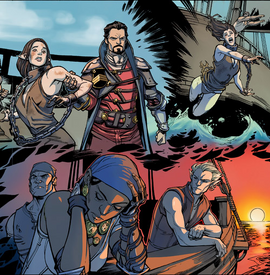
Isabela reflects on her past deeds
One day the Orlesian navy cornered their ships in the Venefication Sea. Lord Devon had packed the holds tightly and Isabela failed to outmaneuver the Orlesians which forced them to throw the chained slaves to the ocean in order to escape. Rasaan comforts Isabela; though when she still refuses to reveal her name, Rasaan strikes her again and attempts to force her face into the qamek. This would in effect make her viddath-bas rather than viddathari, as conversion to the Qun would be involuntary for Isabela.
Isabela overpowers Rasaan and escapes her cell. Isabela eventually locates the cell where Alistair and Varric are held. She releases them, telling them to escape, while she went to rescue her crew. In the end Isabela finds her crew and told them about the dangers of trying to escape and asks them to choose whether they want to stay or come with her. Her crew decided to come with her.
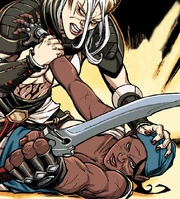
Isabela fighting against Rasaan
However before she has a chance to open up the cells, Rasaan appears. She said that the other Qunari thought she'd try to escape but she knew her better. The enraged Rasaan didn't care anymore to convert Isabela, believing that the solution is only her death. In the fierce battle that ensued, Rasaan was eventually defeated. Isabela holds her dagger to Rasaan's throat, ready to make the kill. She then tells her that her birth name was Naishe but it isn't anymore. She then drives the dagger into the ground deliberately missing Rasaan's head showing that she had no intention of killing her.
Alistair at the same time was also dueling Sten whom he managed to defeat. Alistair refuses to kill him and instead offering him to work together against Titus, which Sten accepts this time. Accompanied by two Qunari dreadnoughts, Isabela along with Alistair, Varric, Sten and her crew set sail once more in her restored pirate ship towards Titus' stronghold in Seheron.
On board the ship, Isabela again reaffirms her determination to help Alistair with his mission.
Dragon Age: Until We Sleep
Qunari dreadnoughts attack Aurelian Titus' fortress and Varric infiltrates the building while Isabela and Alistair assault the fortress directly with the Qunari. Prior to this, Sten/the Arishok tells Alistair and Isabela the Qunari version of the myth of King Calenhad, and how he made a deal with a mysterious witch to drink dragon blood, become a Reaver and create Ferelden.
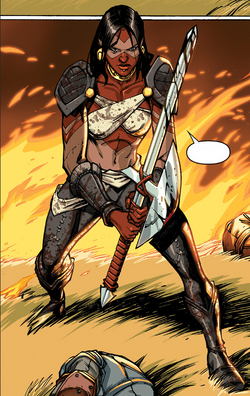
Isabela's nightmare as a Qunari convert wearing Vitaar
Varric's attempt to free King Maric from the Magrallen causes everyone to be pulled into the Fade. Isabela is found trapped in a nightmare created by magister Aurelian Titus in the Fade, where she is a Qunari and no longer remembers her true past. Varric and Maevaris Tilani find her but she doesn't recognize them as anyone but bassra and attacks them. Eventually Titus finds them and summons demons to kill them all. The trio all escape and once safe, Varric tries to remind her of who she really is and that this Qunari facade is not who she wants to be. Although she initially believes it would be easier to submit to other's expectations, she is eventually convinced that she does not want to be defined by others; thus making peace with her doubts and trials and also becomes content with her self perception and dignity as a hero. The trio then head off in search of Alistair. The trio find Alistair with the real Maric in the Fade and together convince King Maric to aid them in killing Aurelian Titus. Isabela rejoins Alistair and Varric to attack Titus and distract him long enough to allow Maevaris and Maric to kill him. After escaping the Fade she is present when Alistair shatters the Magrallen, killing Maric. Afterwards she asks Varric if Alistair had made the right decision, to which he replied he didn't know.
Afterwards Isabela leaves her ship for destinations unknown.
Dragon Age: Inquisition
Isabela later reaches an agreement with the Inquisition, serving as one of their field agents on a number of raids across Ferelden and Orlais.
The Inquisitor can ask Varric Tethras about her fate. Varric will state that she went back to the Raiders of the Waking Sea and is calling herself an admiral. Varric however admits he isn't sure if she actually has a position of authority within the Raiders or if it's just another self-styled title.
Quests
Act 1
Act 2
![]() A Ship for Isabela (gift)
A Ship for Isabela (gift)
Act 3
![]() A Rivaini Talisman (gift)
A Rivaini Talisman (gift)
Mark of the Assassin
Gifts
- A model Ship in a Bottle can be found in a chest during the quest Blackpowder Courtesy in Act 2 when traveling through the smuggler's caves (in a chest near some stairs).
- Rivaini Talisman can be found in Act 3 in the Disused Passage at the Docks.
Initial statistics
Dragon Age II
Talent trees
| Available talent trees | Initially selected talents |
|---|---|
Dragon Age: Inquisition
Initial equipment
| Weapons |
Dragon Age: Inquisition
Initial equipment
| Weapons | |
| Armor |
Isabela specific gear
Armor
- See also: Companion armor
Dragon Age II
Upgrades to Isabela's armor, Threads of the Eastern Seas, can be found at the following locations:
- Act 2 –
 Supportive Corselet – available at Robes by Jean Luc in Hightown. Extra rune slot.
Supportive Corselet – available at Robes by Jean Luc in Hightown. Extra rune slot. - Act 2 –
 Rigid Boning – available at Apparel Shop (Tailor) in Lowtown. +(0.25 * DEF(LVL)) defense.
Rigid Boning – available at Apparel Shop (Tailor) in Lowtown. +(0.25 * DEF(LVL)) defense. - Act 2 –
 Lambswool Insoles – found at the Lost End Foundry in Lowtown during the To Catch a Thief quest, in a crate in one of the upstairs rooms. +2% critical chance.
Lambswool Insoles – found at the Lost End Foundry in Lowtown during the To Catch a Thief quest, in a crate in one of the upstairs rooms. +2% critical chance. - Act 3 –
 Boiled Leather Plates – found in a Mountain Cave during the A Murder of Crows quest, on a skeleton near the entrance. Extra rune slot.
Boiled Leather Plates – found in a Mountain Cave during the A Murder of Crows quest, on a skeleton near the entrance. Extra rune slot.
If Isabela is romanced, she will update her outfit with a black corset, added goldwork embroidery to the bottom hem of her sash, a red scarf around her right bicep, and replaces the leather pauldron on her left shoulder with a metal one.
Dragon Age: Inquisition
- For a full list of Isabela's armour, see Multiplayer armor.
Other
![]() Backstabber – starting dagger
Backstabber – starting dagger
![]() Heartbreaker – starting dagger
Heartbreaker – starting dagger
![]() Lady's Choice – requires Rogue Item Pack
Lady's Choice – requires Rogue Item Pack
![]() The Pearl – requires Rogue Item Pack II
The Pearl – requires Rogue Item Pack II
![]() Dagger of the Four Winds – requires Mark of the Assassin
Dagger of the Four Winds – requires Mark of the Assassin
![]() Badge of the Felicisima Armada – requires Mark of the Assassin
Badge of the Felicisima Armada – requires Mark of the Assassin
Quotes
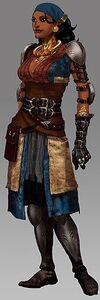
Early concept art for Dragon Age II
- Main article: Isabela/Dialogue
Dragon Age: Origins
- "Be off with you now, and be glad I only took from you your gold! Heh. Fools..."
Dragon Age II
- "Sailing is like sex. Do it wrong, and it'll make you sick. But do it right, and there's no feeling in the world like it."
- "And then Isabela went to the chantry, and saw that it was boring. Canticle of Isabela, stanza one, verse one."
- "When you get right down to it, we're not responsible for anyone but ourselves. You can choose to be free, or you can choose to be saddled with all the world's problems."
- "I like big boats, I cannot lie."
- "Don't bet anything you're not prepared to lose."
- "You see, sweetness, men are only good for one thing. Women are good for six."
- "Shit. What have you gotten yourself into this time, Isabela?"
Dragon Age Inquisition Multiplayer
- "Could you please not talk, I have the worst hangover."
- "This is like that time Merrill cooked mushrooms for dinner." (on being rendered unconscious)
- "Where's my lady battering ram when I need her." (Interacting with a Warrior Wall barrier, referencing Aveline)
Trivia

Tier progression of Isabela in Heroes of Dragon Age
- Isabela was written by Sheryl Chee for Dragon Age II, but David Gaider wrote Isabela for The Silent Grove comic series.
- Mika Simmons does not voice Isabela in Dragon Age II as she did in Origins; this is to reduce confusion, as she also voiced Anora in Origins.[10]
- According to David Gaider, Isabela always had dark skin. Gaider says the promo art of her being pale is a marketing error. In Origins, she is actually dark skinned, but the lighting of the game makes her pale. This can be checked by putting her model into the DA Toolset and seeing it without the Pearl's bad lighting.[11]
- If Isabela isn't recruited during Act 1, the game will continue normally. The only difference is that the player will not find out what relic was stolen from the Qunari.
- In Dragon Age II, she will remember her sexual encounter with the Warden, or lack thereof, at the Pearl in Dragon Age: Origins.
- If you take Isabela into the Deep Roads she may comment nervously on how she "really doesn't like tight spaces", implying that she is claustrophobic.
- Upon meeting King Alistair in the Viscount's Keep, Alistair will say that Isabela looks different, to which Isabela will respond "Don't we all." This is probably an in-game joke referring to the changes in character appearance between the games. If imported from Origins where Alistair is exiled or selecting the "No Compromise" backstory, Alistair will be found intoxicated in The Hanged Man, where Isabela and Alistair will not recognize each other. She will say he's been ranting about being the "Prince of Ferelden" all day and he will say she sounds like Morrigan.
- When imagining a single note scent for Isabela, Sheryl Chee likened her to "spice trade, chocolate mousse and unearthed."[12]
- The general similarity between aspects of Duncan's armor and that of Isabela appears to be indicative of a Rivaini style of armor.[13]
- Official reports from various countries report that Isabela spent a total of seven months and twenty-one days in numerous jails in port cities around Thedas over the course of ten years.[1]
- Isabela has "extensive body piercings."[14]
Bugs
- In the recruiting quest Fools Rush In, if the player loots the corpses before instructed, it is impossible to recruit Isabela.
- Every time you go to the Qunari Compound with Isabela she will disappear with an "excuse". However, if you speak to her while she is talking, she stops what she's saying and stays with you in the Qunari Compound.
- If Hawke has slept with Isabela and pursues a romance with Merrill, it will put the former's romance in a sort of a "ghost" state making impossible for the Merrill's romance to be completed. This means that the romance dialogues of Isabela still play properly, but in certain situations the game won't acknowledge the fact that it's still active (like making the threesome with Zevran impossible, missing companion interactions, endgame outcomes, etc.).
- This bug can be fixed by using the console commands "runscript zz_app_debug" or "runscript zz_isa_debug" and adjusting Isabela's romance flag to "Active". This has been tested only with the Zevran threesome dialogue which it fixes, but has not been tested with any other situations and it may break other things.
- If Isabela is romanced, her outfit may not properly update to the newer version. Using the Maker's Sigh potion from the Black Emporium to respec her skills will update her outfit; picking up any armor upgrades for her also seems to work.
- It has been reported that her romance outfit can also be triggered by pressing the "Escape" key right after the bed scene.
- It is possible that Varric will say that she stayed with the Champion, indicating that she was romanced, even if another companion was romanced. This may happen even if she has left the party.
- Varric will mention Isabela on the docks during the Rise of the Qunari quest regardless of whether of not she was recruited in Act 1.
- Occasionally, Isabela will turn completely white apart from her face before the final battle in Act 3.
- If the Tome is given to Isabela, it is sometimes possible for you to have a scene with her in the Hawke Estate. This can be triggered by speaking to Dog.
- If the Legacy DLC is installed, and you sleep with Isabela but do not pursue a romance, she may still receive her romance armor.
- If Isabela's approval rating is not high enough that she returns to give the Tome of Koslun to the Arishok, she will of course be gone from the party permanently. However, sometimes the game will glitch in such a way that, even though she has left and her friendship was not maxed, Hawke nevertheless has the "Isabela Has Your Back" benefit in the Hawke ability tree, and Isabela's "Threads of the Eastern Seas" outfit remains on the list of armor which can be enchanted with runes. (Confirmed for PS3, unsure about other platforms.)
Gallery
Codex entries
![]() Codex entry: Isabela
Codex entry: Isabela
![]() Codex entry: Isabela - After the Deep Roads
Codex entry: Isabela - After the Deep Roads
![]() Codex entry: Isabela - The Last Three Years
Codex entry: Isabela - The Last Three Years
![]() Codex entry: Notorious Raider Trash
Codex entry: Notorious Raider Trash
![]() Isabela (Inquisition)
Isabela (Inquisition)
References
- ↑ 1.0 1.1 1.2 1.3 Cite error: Invalid
<ref>tag; no text was provided for refs namedwot2 - ↑ All That Remains
- ↑
 Dragon Age: The World of Thedas, vol. 1, p. 81
Dragon Age: The World of Thedas, vol. 1, p. 81
- ↑ Based on conversation between Hawke and Isabela in Dragon Age II after Fools Rush In, where she indicates she has known some of her crew almost that long.
- ↑ "Isabela". BioWare. Retrieved 2011-01-11.
- ↑ As noted in the quest Fools Rush In.
- ↑ As mentioned by Hayder in Fools Rush In.
- ↑ Codex entry: Isabela - The Last Three Years
- ↑
 "Merrill Rejection" . The BioWare Forum.
"Merrill Rejection" . The BioWare Forum.
- ↑
 David Gaider. "The Official Isabela Discussion Thread" . The BioWare Forum.
David Gaider. "The Official Isabela Discussion Thread" . The BioWare Forum.
- ↑
 "You never told us about the DA3 spoilers" . Tumblr.
"You never told us about the DA3 spoilers" . Tumblr.
- ↑
 Sheryl Chee. https://twitter.com/SherylChee/status/381268481481519104 . Twitter.
Sheryl Chee. https://twitter.com/SherylChee/status/381268481481519104 . Twitter.
- ↑
 Mike Laidlaw. https://twitter.com/Mike_Laidlaw/status/394703081457209344/ . Twitter.
Mike Laidlaw. https://twitter.com/Mike_Laidlaw/status/394703081457209344/ . Twitter.
- ↑
 Dragon Age: The World of Thedas, vol. 1, p. 81
Dragon Age: The World of Thedas, vol. 1, p. 81
| ||||||||
| ||||
| ||||||||


